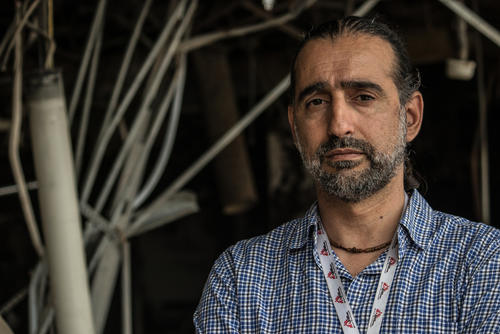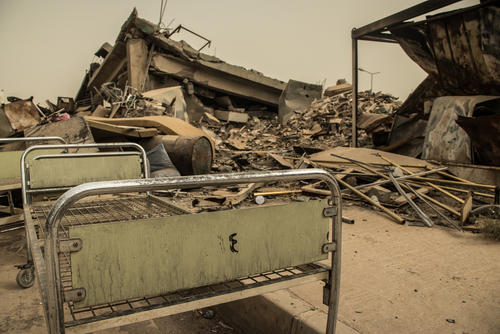- Nicholas Papachrysostomou is Head of Mission of Médecins Sans Frontières (MSF) in Iraq.
- He oversaw MSF's project at Al Khansaa Paediatrics Teaching Hospital in East Mosul, which was recently handed over to Iraq's Department of Health.

Could you describe the healthcare system in Mosul?
Mosul has gone through an excruciating and painful process to reach the point where it is today. There is a lack of access to healthcare and a lack of services. This includes a lack of equipment, medical staff and medication. The number of returnees is increasing but very few hospitals are functioning. It’s a dire situation.
The east of the city is less affected and life is slowly returning to normal. However, the west of the city has been destroyed. For someone returning to Mosul it is very difficult to access healthcare. Most of the hospitals are closed, most of the primary healthcare clinics are not up to standard – in terms of personnel and supplies – and patients have to pay a fee to enter the hospitals.
For us, a fee of 2,000 Iraqi dinars (1.45 euros) to enter a hospital is nothing, but for a returnee, it is a lot of money. If they have children who need medical assistance, they probably wouldn’t be able to afford to treat them. Also, many people have to travel long distances on foot to reach medical facilities because they can’t afford to take a taxi or public transport. This means it’s hard for people to complete the trip in one day.
What kind of problems did MSF teams see?
The people who come to the Al Khansaa hospital are often suffering from diarrhoea and respiratory infections. Some people coming from the camps and west Mosul suffer from malnutrition. They lack access to normal food. Mothers were diluting the milk for their children because, under the Islamic State group, the price for one can of infant formula was so high. Because mothers were giving the children diluted milk, the children were losing weight.

When a patient is severely or acutely malnourished, they can face several complications that can lead to death. Their immune systems are compromised so their bodies don’t react normally to infections. A small infection can cause death.
The people living in the west side of Mosul face the biggest challenges. MSF runs one of only two functional hospitals there, but access to healthcare is still a challenge as the number of people returning is well above the capacity of the health infrastructure in that part of the city. Many can’t afford to pay for taxis or public transport to get to Al Khansaa in east Mosul if they need to, and we faced many problems following up on patients who couldn’t afford much-needed trips to the hospital.
Many patients treated for severe acute malnutrition would improve in the hospital, but then they would go home and not return for the follow-up. The patients we would see after a prolonged absence were severely malnourished again.
What has MSF done at Al Khansaa hospital?
When we started working here, it was chaos. It was really shocking to see inside the hospital. It was utterly destroyed. Everything was very dirty and burnt objects could be seen in the corridors and in the patients’ rooms.
The project was focused on re-establishing essential services in the Al Khansaa Paediatrics Teaching hospital, one of the largest hospitals in Mosul. The aim was to rebuild a new emergency room, which had been completely destroyed. We restored an intensive care unit, also destroyed, and we rehabilitated some of the rooms in the paediatric ward. Our team established a nutrition programme with spaces for an inpatient and outpatient feeding. The programme provided treatment for children with severe acute malnutrition some of whom had been living in the camps or in west Mosul and had not been able to access adequate food.
When we opened the emergency room, this motivated the hospital staff to do further cleaning and repairs. It encouraged the staff and patients and gave them hope.
The intensive care unit is the only one of its kind in Mosul. It’s only a small unit with four beds, but it’s the only chance a severely unwell patient has to survive. If it didn’t exist, patients with severe health issues would die.
Our goal was to address the lack of basic healthcare and ensure the hospital improved in terms of access and services. People had to pay to access services at the hospital, and we knew this was a barrier for many people. So we provided incentives to many of the staff so they could provide free services. It was a complicated task, and not all the services were provided for free, but at least it was an improvement.
It is crucially important for this work to continue. The rebuilding of essential medical services is of life-saving significance during this phase of Mosul's post-war recovery.
Between July and October, MSF teams supported 2,532 admissions in the emergency room; 746 admissions in the inpatient department and treated 159 malnourished children through inpatient and ambulatory feeding programmes in Al Khansaa hospital of east Mosul.
MSF handed over the project to the Department of Health in November 2017 after four months of work. We also runs another hospital in west Mosul.
The organisation works across Iraq in the governorates of Dohuk, Erbil, Sulaymaniyah, Diyala, Ninawa, Kirkuk, Salaheddin, Anbar, Baghdad and Babylon. MSF provides basic healthcare, nutrition programmes, trauma care, emergency surgery, services for expectant and new mothers, treatment for chronic diseases, mental health support and health education activities.
MSF started working in Iraq in 1991 and provides medical care to vulnerable Iraqi communities, displaced families and Syrian refugees who find it difficult to access health services.



